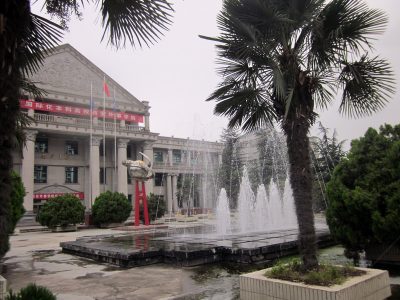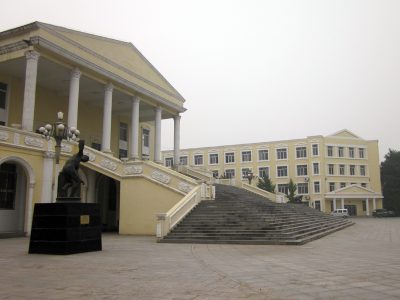 Xi’an International University, above, is frequently rated as one of the best private universities in China. (Photo by Sarah Butrymowicz)
Xi’an International University, above, is frequently rated as one of the best private universities in China. (Photo by Sarah Butrymowicz)
LANGFANG, China — Hundreds of private colleges and universities have opened in China in the past decade in response to soaring demand for higher education in the world’s most populous nation.
The growing private sector fills a niche in a market long dominated by public universities. The private schools offer millions of students a no-frills education and a better shot at a paycheck after graduation as China continues its quest to gain influence in the world economy.
The new schools have flooded China’s big cities, spilling over into places such as Oriental University City, a complex here in the Hebei province, an hour south of Beijing. It has 14 private universities, one shared library and a handful of fast-food restaurants to feed tens of thousands of students.
“Everyone wants to have an education, but the ability of the country is limited. Public universities cannot meet the need,” said Rao Dujun, director of the international office at the private Xi’an International University in the Shaanxi province of central China. “This is why private universities can emerge.”
Lessons From Abroad
This story is part of The Hechinger Report’s ongoing series on what the U.S. can learn from higher education in other countries.
The number of private universities in China has soared to more than 630, up from 20 in 1997, according to a 2010 analysis from the Center for International Higher Education at Boston College. In all, the private institutions enrolled about a fifth of Chinese college students in 2008.
Private university administrators and critics of the schools have warned that as China’s population growth slows, the boom in private universities may subside and only the best ones will survive. Some have amassed enormous debt from purchasing land and building facilities. But these schools have been integral to the expansion of Chinese higher education.
In the late 1990s, fewer than 10 percent of Chinese age 18 to 22 were enrolled in higher education, according to government data. Now the figure is about 27 percent — or 30 million students — and the government hopes to reach 40 percent by 2020. If China is successful, it will have more than 40 million students in college. That would be roughly double the projected total for the United States. The U.S. population, however, is significantly lower than China’s.
In China, a college degree is often crucial for upward mobility. Competition is intense for available spots. By contrast, the United States is focused on persuading students to enroll in college and to stay and complete degrees once they do.
Higher education in China was gutted during the Cultural Revolution of the 1960s, but has been built up again. In 1999, the authoritarian Communist government decided to remove restrictions on the private sector of higher education in an effort to propel economic growth.
In 2003, the government permitted private schools to partner with public universities. Although still self-funded and self-governed, these new “independent schools” gained some prestige through the associations while also helping public universities deal with overflow.
Unlike their public counterparts, private universities across China emphasize practical skills over theory. The Civil Aviation Management Institute, for instance, teaches security guards-to-be to operate metal detectors. Students in Xi’an International’s automobile college learn how to fix cars, whereas at a public university they might learn how to design them.
“That’s just not our job,” Rao said.
Some of the more established private institutions across the country, such as Xi’an International — a constant presence on the government’s top-10 list of private universities — are able to fill seats with little or no recruiting.
Still, private schools are often the second choice of students who score poorly on the national entrance exam. Private institutions typically charge double what public ones do — about $1,500 a year, compared with $750 — and are generally viewed as having lower-quality programs.
Official statistics are not available, but private colleges claim employment rates for their graduates that are higher than those of their public counterparts. While public schools have to work with the curriculum set by the government, private universities can create or change majors on a regular basis, in response to the job market.
Hou Yifei, an electrical-engineering major at the 10-year-old private Oxbridge University in Kunming, a city in southern China, called some aspects of public universities “old fashioned.”
 Just three years old, the Oriental Institute of Technology, above, is one of 14 private universities in China's so-called "Oriental University City." (Photo by Sarah Butrymowicz)
Just three years old, the Oriental Institute of Technology, above, is one of 14 private universities in China's so-called "Oriental University City." (Photo by Sarah Butrymowicz)
“I think I can get a better lesson, a better job after graduation” than at some public institutions, Hou said recently.
Here in Langfang, the Oriental Institute of Technology offers 25 majors — including hotel management, historical artifact restoration and dance — up from five when it opened in 2009. Its main office is filled with glossy brochures detailing courses and potential jobs. One brochure, replete with pictures of lush green grass, describes how students can turn a physical-education major into a career in golf-course management.
Whether a degree from a private college is the path to a lucrative career remains unclear.
Yan Fenqiao, a professor at the public Beijing University who has studied private higher education in China, believes that private-university graduates are less picky than their public-school peers. “It’s not a problem to find a job,” he said. “It’s a problem to find a good job in a big city.” For the jobs that private-university graduates are taking, Yan said, a high school diploma would usually suffice.
Government jobs are among the most coveted. But private-university graduates have difficulty competing for them, said Yong Zhao, associate dean for global education at the University of Oregon’s College of Education. Zhao, who gives his surname second following U.S. custom, said private Chinese universities invest less in education and hiring high-quality faculty members because the institutions are seeking to make money. Some private schools, such as Xi’an International, say they are not run for profit; other schools say that they are.
“They may tell you [they’re] not-for-profit, but there’s a profit motive,” Zhao said. “When there’s a profit behind it, of course you would try to cut cost.”

Nenhum comentário:
Postar um comentário